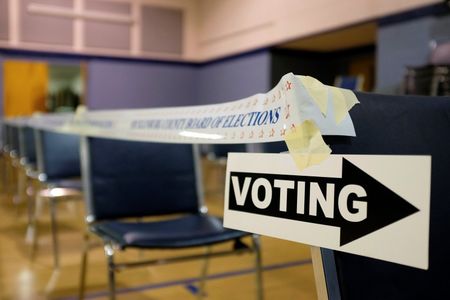By Steve Holland
WASHINGTON (Reuters) - Republicans are poised to make major gains and possibly recapture control of the U.S. Senate on Tuesday in midterm elections that could serve as a public referendum on President Barack Obama's job performance.
Millions of Americans will cast ballots to elect 36 senators, 36 governors and all 435 members of the House of Representatives in campaigns influenced by Obama's low job approval rating, partisan gridlock in Washington and a U.S. economy that is not growing widely enough to help many in the middle class.
Republicans are expected to pick up seats in the U.S. Senate, but polls show eight to 10 races are still toss-ups and it is unclear whether they can gain the six seats they need to control the 100-member chamber for the first time since the 2006 election.
The battle for control of the Senate also could extend beyond Tuesday night. Senate races with multiple candidates in Louisiana and Georgia, where the winner must get more than 50 percent of the vote, could be forced into runoffs in December and January, respectively.
Seizing the Senate would give Republicans, who are expected to build on their majority in the House, complete control of both chambers of Congress.
That would constitute the most dramatic political shift since Obama entered the White House in early 2009 and would complicate his last two years in office, perhaps forcing him to make more concessions to his Republican opponents than he would prefer.
The White House tried to play down the prospect of sharp changes in strategy by the president after the election. White House spokesman Josh Earnest noted that many of the contested Senate races where Democrats were in trouble were in states Obama lost to Republican Mitt Romney in the 2012 election.
"It would not be wise to draw as broad a conclusion about the outcome of this election as you would about a national presidential election simply by virtue of the map," he told reporters.
Democratic senators are battling for re-election in tough races in Alaska, Arkansas, Louisiana and North Carolina, all won by Romney in 2012. Democratic Senator Mark Udall also is in a tight race in the swing state of Colorado, and the fight to replace retiring Democratic Senator Tom Harkin in the swing state of Iowa is a toss-up.
Republicans are in tight races to retain their seats in Georgia, where Senator Saxby Chambliss is retiring, and Kansas, where an independent is challenging Republican Senator Pat Roberts.
Republican Senate Leader Mitch McConnell of Kentucky, who polls show has a slight edge over Democratic challenger Allison Lundergan Grimes, would replace Democrat Harry Reid as Senate majority leader if Republicans win the Senate and he hangs on for re-election.
"Obviously, we intend to be a responsible governing Republican majority, if the American people give us the chance to do that," McConnell told ABC News on Monday.
Obama's low public approval rating of around 40 percent made him a political liability in some states on the campaign trail, where his last campaign appearance was on Sunday in Philadelphia. He stayed in Washington on Monday and met with Federal Reserve Chairwoman Janet Yellen.
Obama will face pressure to make changes at the White House if his party loses the Senate. A Reuters/Ipsos poll showed 75 percent of respondents believe the administration needs to "rethink" how it approaches major issues facing the United States. Sixty-four percent said Obama should replace some of his senior staff after the election.
But a White House official doubted there would be a major shakeup no matter what the outcome on Tuesday.

"We're talking about votes in a bunch of states that didn't vote for the president," the official said.
(Additional reporting by Roberta Rampton and Jeff Mason; Editing by John Whitesides and Ken Wills)
